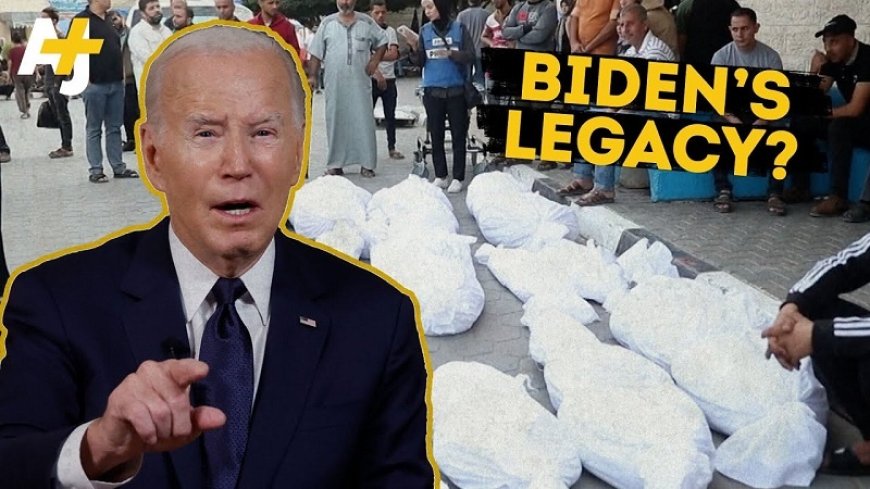Professor Ibrahim Fraihat: Third Major Conflict of Biden Administration: Lebanon War
Professor of International Conflict Resolution Ibrahim Fraihat of the Doha Institute for Graduate Studies has harshly evaluated the Middle Eastern bloodshed, attributing the continuing war in Lebanon to more general U.S. foreign policy under President Biden. Following the Ukraine war and the rise of violence in Gaza, Professor Fraihat said in a recent Al Jazeera interview the fight is the third major war the Biden administration supports.

Professor of International Conflict Resolution Ibrahim Fraihat of the Doha Institute for Graduate Studies has harshly evaluated the Middle Eastern bloodshed, attributing the continuing war in Lebanon to more general U.S. foreign policy under President Biden. Following the Ukraine war and the rise of violence in Gaza, Professor Fraihat said in a recent Al Jazeera interview the fight is the third major war the Biden administration supports.
Although many analysts expected the Israeli-Palestinian conflict to spread into Lebanon, Fraihat was especially affected by the fast increase of civilian casualties. " Almost 500 civilians have been killed in just one day," he said, stressing the shockingly high human cost of the fighting. Pointing out Western governments' absence of significant words or attempts to compel Israel into stopping its military activities, he voiced worries over their inactivity.
Fraihat did not hold back when assigning blame for the war at the Biden government's feet. "After Ukraine and Gaza, this is the third conflict the US sponsors during his leadership. Since he is arming Israel with additional weapons and personnel, the deeds speak for themselves, Fraihat stated.
His comments capture a growing belief that under Biden, the U.S. government has progressively supported military aid and participation in foreign wars, sometimes resulting in escalations instead of resolutions. Biden's support of Israel—both militarily and financially—has, the lecturer underlined, empowered the nation in its continuous war operations. "The war in Lebanon has resulted from Biden's defeat in Gaza since he has been supporting Israel there and encouraging it," Fraihat said.
The fast escalation of the violence and the U.S. reaction also throw a shade over Secretary of State Antony Blinken's diplomatic initiatives in the area. Fraihat questioned Blinken's several journeys to the Middle East, pointing out that his seven visits have not yet yielded any noticeable outcomes, including failed negotiations for successful hostages release.
Fraihat brought a grim possibility as the situation gets worse: "No one knows, maybe there will be a fourth war before Joe Biden leaves office." This bleak forecast highlights worries about how the U.S. government's policies can cause more instability in a territory already afflicted by conflict.
American Foreign Policy: A Legacy Emphasized on War
The criticism by Fraihat draws attention to a larger discussion about the direction of US foreign policy under Biden. His government has come under fire for managing several conflicts, including its relentless support of Ukraine in its battle against Russia, and now for the growing confrontations between Israel, Gaza, and Lebanon. The distinction between assistance and involvement gets hazy as Washington gives its allies military and financial backing.
The Biden administration's emphasis on military aid has some people wondering whether these initiatives are aggravating rather than encouraging diplomatic solutions for problems. Biden has justified his choices as required actions to preserve stability and safeguard American interests, while others such as Fraihat contend that this strategy is narrow-minded and detrimental.
More General Consequences of the Lebanon Conflict
The spread of the fighting into Lebanon complicates an already unstable Middle Eastern scenario even more. Long considered as a major actor in the geopolitical dynamics of the area, Hezbollah is a strong militant group from Lebanon supported by Iran. An Israeli-Hezbollah conflict would complicate the already difficult situation even further by perhaps including more players from all around the area.
The world is keenly observing to see how the matter will turn out, hence Fraihat's remarks fit at this moment. Will the U.S. intensify its military backing to Israel, therefore aggravating the conflict? Alternatively would it follow a more diplomatic route, as detractors such as Fraihat hope? In any case, the foreign policy choices of the Biden government will have long-lasting effects not only for the area but also for the world community.
With the possibility for even more turbulence before Biden's tenure ends, the next months could expose much about the path of U.S. engagement in world conflicts, as Professor Fraihat advised. The spread of the conflict into Lebanon may only be the start of a far more serious disaster.













































